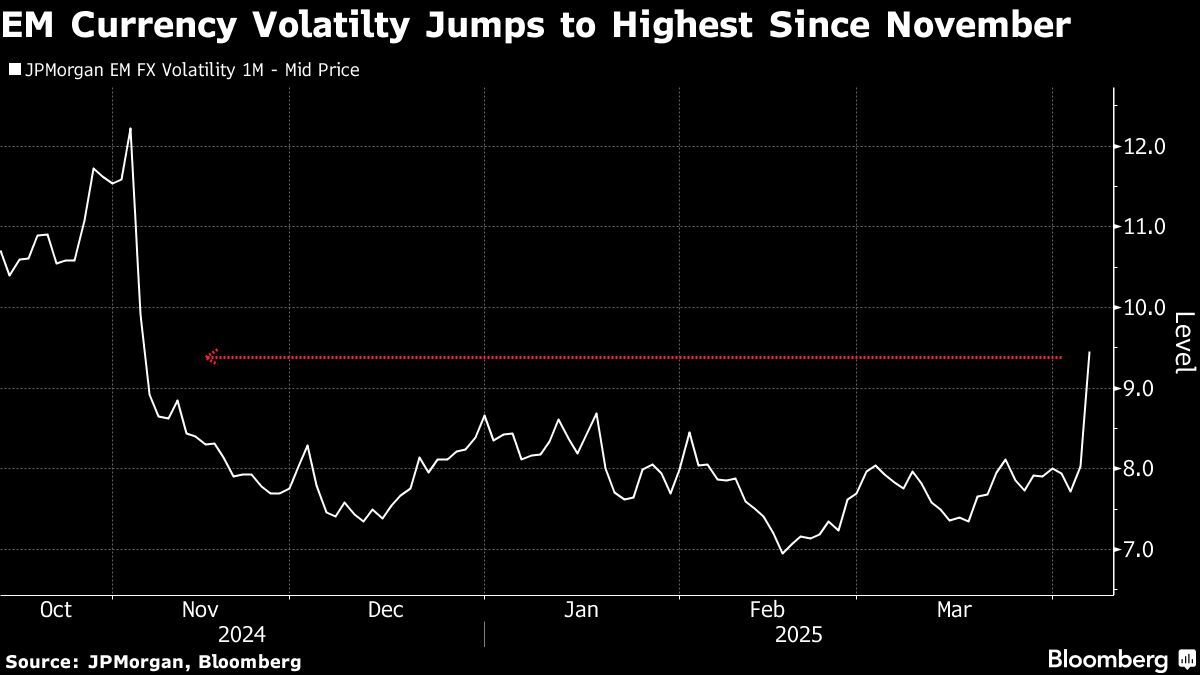
(April 5): Indonesia’s central bank pledged to intervene in domestic markets to ensure rupiah stability as global market volatility surges amid an escalating US-led trade war.
Bank Indonesia will intervene in the spot foreign exchange, domestic non-deliverable forward and government bond markets, it said in a statement on Saturday. It will ensure sufficient foreign exchange liquidity to meet the needs of banks and businesses as well as to maintain market confidence.
The statement came as a deepening trade war between the US and its trading partners tanks stocks and other risk assets across the world and sends investors to havens. Traders expect more unease ahead, with JPMorgan’s gauge of implied emerging market currency volatility jumping to the highest since November on Friday.
Asian markets are set to remain pressured with Trump’s so-called reciprocal levies adversely impacting the region. The MSCI Asia Pacific Index fell 4.5% last week, the deepest weekly slump in a year, while a gauge of regional currencies fell to their lowest in a month after Trump’s announcement. In the US, stocks fell the most since March 2020 on Friday.
Indonesia’s markets have so far avoided the turmoil as they have been closed since March 28 for holidays. The rupiah is expected to weaken when markets reopen on Tuesday, with the offshore one-month dollar-rupiah outright non-deliverable forward climbing about 2.5% since domestic markets shuttered prior to the holidays. Cash rupiah trading typically follows the forwards.
The central bank will continue to monitor developments in global and domestic financial markets, it said in the statement. Like most neighbouring Southeast Asia countries, the Indonesian government is looking to negotiate with Washington and intends to ease domestic trade rules. The US is one of Indonesia’s top trading partners and contributed to its largest non-oil and gas trade surplus last year.
“We see the potential for hot money outflow to occur in the early trading period after the long holiday,” Myrdal Gunarto, an analyst at PT Bank Maybank Indonesia in Jakarta, wrote in a note on Saturday. “Investors, both local and foreign, will immediately take profit as a reaction to the less conducive global developments.”
Uploaded by Chng Shear Lane
- Unlocking value of Lai Meng school land
- Indonesia detains judge for alleged bribery in palm oil case involving Wilmar's unit
- Apple, Nvidia score relief from US tariffs with exemptions
- Fahmi gives telcos until 5pm today to resolve internet issues, or face stern action
- Apple was on brink of crisis before tariff concession from Trump
- Central banks prepare first G7 responses to US chaos
- Israeli missiles strike Gaza hospital, patients evacuated
- Road closures, diversions during upcoming Chinese President Xi Jinping’s visit to Malaysia
- King, Queen extend Vaisakhi, Tamil New Year greetings
- CJ’s appointment process: Govt open to proposals on improving laws — Fahmi

